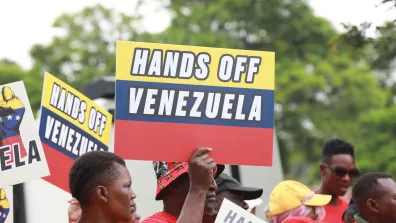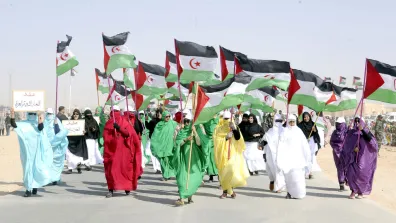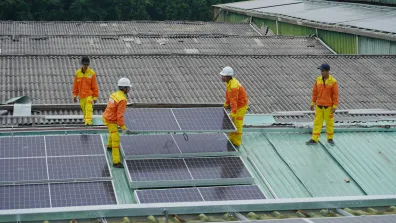Oil uprising: Two decades after Ken Saro-Wiwa's death, the Ogoni struggle is reigniting
The fuel subsidy uprising went on for almost two weeks and offered a glimpse of the country's simmering social unrest.
‘On the first day people went to protest about the fuel subsidy removal. By the tenth day they were protesting about poverty, corruption and the theft of our resources,' says Nigerian activist Ken Henshaw. ‘People think that the fuel subsidy uprising was spontaneous,' he continues. ‘But it took months of preparation, organising, educating people using the fuel subsidy issue. The uprising ended but a movement is building... we are just waiting for the next issue which will light the touch paper.'
Quite how this movement will develop in a country where 100 million live in destitution, according to World Bank figures, is unclear. Disillusionment with established political parties is endemic. Goodluck Jonathan's presidency is slipping deeper into corruption scandals. Protests and strikes are common. The Academic Staff Union of Universities (ASUU) recently organised a five-month strike that paralysed the state university system, while in December the Nigerian Medical Association announced that doctors in public hospitals would begin an indefinite strike over terms and conditions. Oil refinery workers are protesting against the privatisation of the country's oil refineries.
A year for change
During our visit to Nigeria at the end of last year, one idea kept being spoken about: the importance of 2015 as a year for change. As well as national elections to choose representatives from the president through to powerful regional governors, a ‘national dialogue conference' will be held for the first time to discuss the future of the country and its federal political system. So-called ethnicity politics play an important role in Nigeria, whose map was sketched by its former British rulers, meaning that many ethnic groups remain politically and economically marginalised to this day, and simmering tensions remain.
People who live in the oil-rich territories in the Niger Delta complain that for over half a century they have suffered the environmental destruction and violence that oil extraction has brought to their communities and yet live in squalor as the oil is sucked out from beneath their feet. Many people we spoke to were sceptical about the president's motives for calling the conference and whether it will bring about any real change. But social movements are nonetheless preparing to mobilise around it as a way to drive more systemic change, and already it is provoking important debates on fundamental issues.
2015 is also an important year because it will be the 20th anniversary of Ken Saro-Wiwa's execution. During our visit we marched in Port Harcourt alongside thousands of Ogoni indigenous people to commemorate the 18th anniversary of the execution of their inspirational leader. It was an emotional occasion, which demonstrated not only how much the author, poet and activist still means to his people, but also that his struggle continues.
Saro-Wiwa famously led the Ogoni people against Shell's catastrophic destruction of Ogoni land and their continued political and economic marginalisation, a struggle that reached a historic pinnacle 20 years ago on 4 January 1993. That day around 300,000 Ogonis held a mass demonstration, declaring their absolute nonviolent opposition to the presence of Shell in their territory. The Ogoni people demanded that Shell leave their land, and declared that 4 January would henceforth be known as ‘Ogoni Day'.
The momentous protest heralded the arrival of a potent political force and demonstrated the awakening of the Ogoni people. Shell was rocked, and pulled out of oil production in Ogoniland shortly afterwards – to this day the company has not been allowed to resume. The protest was the result of remarkable grassroots organising and educational processes that encouraged Ogonis to not only examine the root causes of the exploitation, political and economic marginalisation and environmental destruction they had faced for over three decades, but also to begin to construct alternatives.
In the words of Saro-Wiwa, ‘It was not just about change for the sake of change, but about self-reliance and recreating Ogoni society.' He drove the creation of the Movement for the Survival of the Ogoni People (MOSOP), the umbrella organisation that acted as the vehicle for the Ogoni struggle and included women's groups, students, tribal elders and youth groups. The organisation is still recognised as the voice of the Ogoni people.
Ogoni rights
Saro-Wiwa was the ideologue of this movement and it was he who developed the philosophical foundations of the Ogoni struggle, preaching nonviolence and developing the Ogoni bill of rights. The bill of rights remains the bible of the Ogoni struggle, setting out demands for social, political and environmental justice, including sovereignty over resources in their territory.
Saro-Wiwa's ability to mobilise the Ogoni people to demand a say in what happened to the natural resources contained in their territory set a dangerous precedent for powerful economic interests, not only Shell. Such resistance represented a risk to their future access to the natural riches of the Niger Delta. The response of the Nigerian military government was a violent onslaught in which 27 villages were destroyed, around 2,000 people killed and 80,000 displaced. This was followed by Saro-Wiwa's execution along with eight others in 1995.
The wave of violence and the executions set back the struggle and served as a warning to any other ethnic group that dared to resist the oil industry. But now, 18 years after Saro-Wiwa was killed, the Ogoni struggle is reigniting once more. The issues remain unchanged and are ‘even worse today than when Ken was alive', according to Celestine Akpobari, coordinator of the Ogoni Solidarity Forum. These include extreme poverty, continuing economic and political marginalisation, and large-scale environmental destruction. During our visit, Akpobari and other leading Ogonis featured in local and national media declaring that the ‘Ogoni struggle is going into a new phase and we are mobilising for a series of nonviolent actions which will cripple economic activity'. On 10 December, World Human Rights Day, they did just that, shutting down two oil refineries and a petrochemical plant in Port Harcourt. ‘This is just a taste of what is to come,' Akpobari told reporters.
Beyond the Delta
The Ogoni struggle is of vital importance not only because it is a struggle for the very survival of the Ogoni people. It is also a catalyst, a source of inspiration and a standard bearer for many struggles in the Niger Delta and across Nigeria. Nigerian activist Nnimmo Bassey has spoken of how the Ogoni bill of rights ‘inspired other ethnic nationalities in the Niger Delta to produce similar charters as a peaceful way of prodding the government into dialogue and action'. According to Bassey, real change will come in Africa when ‘struggles erupt to fundamentally and basically reclaim the people's sovereignty and break the grip of the neocolonial elites on our natural resources'. The impact of the Ogoni struggle could reach far beyond the Niger Delta.
Powerful political and economic interests will seek to maintain the status quo, potentially with violence. Ken Saro-Wiwa's persecution and execution ignited a movement of international solidarity. There is a need for this international movement to be resurrected, particularly in the power centres where oil is consumed and corporations are based.
In the Delta
We went to Nigeria in November, visiting many communities in the Niger Delta that are suffering from pollution and conflict as a result of oil operations. The two communities that exemplified this most are Goi and Rumuekpe. Goi has been described as the most polluted place in Ogoniland, a sheen of oil on the water that was once used for drinking and fishing. The place is deserted now. We visited the abandoned houses and bakery that used to be bustling before the spills.
Rumuekpe is a main artery of Shell's eastern operations in Rivers State. Crucially, it acts as a gathering point for oil and gas pipelines that criss-cross the area. Approximately 100,000 barrels of oil flow through per day. Far from benefiting from its strategic location, however, Rumuekpe lacks even basic infrastructure, while at least 60 people, including women and children, have been killed by inter-communal conflict as armed gangs have fought pitched battles over access to oil contracts and payments.
We timed our visit to coincide with the yearly mobilisations to commemorate Ken Saro-Wiwa's execution. The events started on 9 November with candlelit vigils in different locations in Port Harcourt, the city where he worked and died. We travelled with two well-known activists, Celestine Akpobari and Ken Henshaw, who work at an NGO called Social Action, which focuses on human rights, environmental struggles and empowering communities.
Patrick Kane of War on Want and Sarah Shoraka of Platform report from the Niger Delta on the Ogoni people's struggle against Shell and the wider mobilisation in Nigeria towards 2015 as a ‘year of change'.


